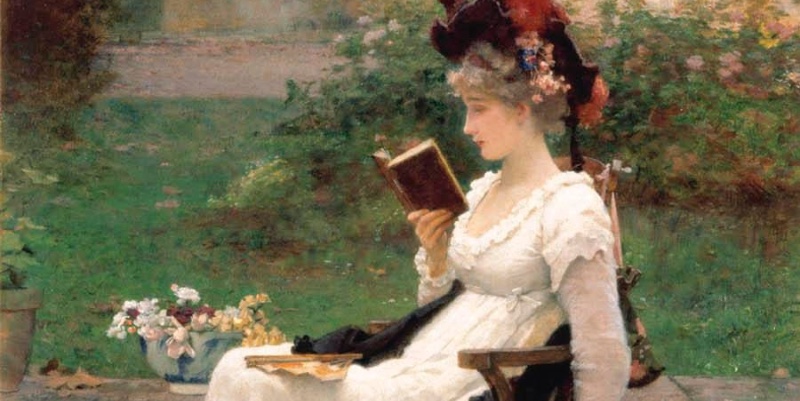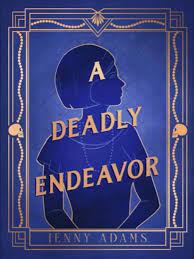Two of my great literary loves are historical mystery and romance–especially when they star strong, complex, and messy female main characters. The kind that reviewers call unlikable, or spoiled, or complicated, and who sidestep completely the trap of “not like other girls.” My favorites are characters who are unabashed in their femininity and willing to get their hands dirty. They show tremendous growth over their arcs yet remain completely consistent with their characters.
When I sat down to craft my own sleuth, I wanted to find a way to capture all of these elements and create my favorite kind of character. In A Deadly Endeavor, my main character, Edie Shippen, has been accused on the page as being spoiled and shallow. Another character describes her as a butterfly–beautiful, but flitting about life without any real focus. Over the course of the book, she throws herself into discovering who was behind the murder of her cousin and other young women in her acquaintance, and balances sleuthing with the desire to be properly accessorized. Because the people in her life constantly dismiss her as flighty, no one expects her to catch a killer…except the handsome young coroner, Gilbert, who’s sister is also among the missing.
Edie’s not alone. So many of my favorite historical mysteries star the exact type of strong, complex, and messy female protagonists that I love…women who refuse to be put into the boxes that the world around has built for them. Here are a few of them – and I’d love to hear your suggestions for more!
Nekesa Afia does an amazing job with the character of Louisa in her Harlem Renaissance Series, starting with the stand-out Dead Dead Girls. Lou is Black and queer in 1920s Harlem, and if that isn’t hard enough, she’s also famous for escaping a serial killer as a teen. Over the course of Dead Dead Girls and Harlem Sunset, we see Lou grapple with the cases thrust upon her (and her missteps along the way). Lou is prickly and impulsive and so very, very real – I loved her from the very first page, and I can’t see where she ends up in Lethal Lady, the next installment in the series.
Saffron Everleigh, the titular sleuth in Kate Khavari’s series that begins with A Botanist’s Guide to Parties and Poisons, has to straddle her upper-class roots and the cruel world of 1920s academia, where, as a woman, she is decidedly unwelcome. Saffron manages to juggle these conflicting pressures with murder investigations and blossoming romance. She’s far from perfect, and Khavari does a deft job of avoiding the “not like all the other girls” trope that strong characters often fall into. She’s bold and driven, yes, but is far from perfect, and leans heavily on her friendship with Elizabeth, her childhood best friend.
Another historical mystery series with a complex leading lady is Kate Belli’s Gilded Gotham series. Genevive has a lot in common with Saffron and my own Edie–they’re all young women born of immense privilege, straining at the boundaries society has imposed on them. Gen is passionate and driven–and, at the beginning of the series (Deception by Gaslight), filled with a naivety and impulsivity that puts her into danger and sets her up to be at odds with the mysterious Daniel (swoon). I absolutely love the growth of Genevive over the four books of the series, and I sincerely hope we get to see more.
Katie Tietjen’s Maple Bishop is another complex character I can’t get enough of. In this debut Death in the Details (out in April), Maple is a recent widow of the Second World War on the verge of pennilessness in rural New England. Grieving and alone, she finds solace in constructing dollhouses, and finds her skills as a miniaturist and her keen knowledge of the law (she trained as a lawyer in prewar Boston) put to the test when she stumbles upon a murder that rocks her tiny town to its core. Maple faces a lot of pressure to stop, but refuses, and she shows a lot of grit while she tracks down a killer.
I’d be remiss to write any list of complex heroines in historical mysteries without talking about the queen of them: Miss Charlotte Holmes in Sherry Thomas’s Lady Sherlock series. When we first meet Charlotte in A Study in Scarlet Women, she is purposefully “ruining” herself by setting herself up to be caught in a compromising situation with a (married) man: her way of freeing herself from the expectations of the London upper class. Over the course of the series, we see Charlotte make a life for herself as the sister of “Sherlock Holmes”, a bedridden detective, and solve a wide array of crimes with the help of her friend and landlady, Mrs. Watson, and her well-positioned childhood friend, Lord Ingram. Charlotte is brash and outspoken, with a keen sense of justice and an unwavering commitment to the people she loves. She’s also very stereotypically feminine: she’s beautiful and loves pretty dresses, while being the greatest mind of her time. It’s so fun to see a beloved character turned on its head.
So often, “strong female character” is boiled down to women committing violence, or taking on a traditional masculine role, but there are so many ways to be strong, and I love that these characters show us the full range of human emotion, and demonstrate to us just how complex human beings are. I can’t wait to keep reading about them.
***


















